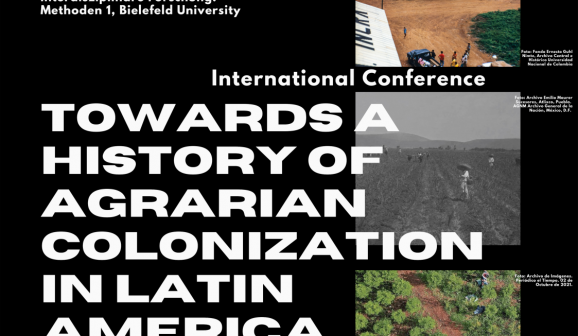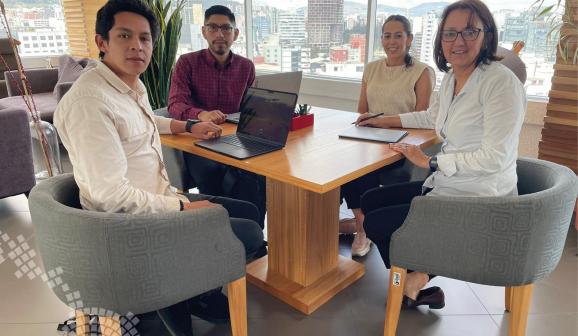Turning Land into Capital. Historical Conjunctures (Re-)Production of Wealth in LA from the 19th to the 21st century.
Unequal land distribution in Latin America and the Caribbean is a phenomenon with a long historical evolution from the beginning of the European conquest until today. The high concentration of land ownership in the hands of a few individuals and families has made Latin America the region with the most unequal land distribution in the world. This project applies new theoretical and methodological approaches to land as a means of reproducing wealth from a multidimensional perspective. Inspired by Bourdieu's perspective on the transformation of different types of capital (economic, cultural, symbolic, social, political, etc.), the project proposes to discuss the economic dimension of the reproduction of wealth in its interaction with cultural and social values and practices (habitus), its links to the political system, and its impact on the transformation of landscapes and ecosystems. The goal is to understand the role of land as a means of (re)producing wealth in Latin America and the Caribbean in two key historical transformation phases of accelerated accumulation of land.
Transformation phases
The first period is characterized in economic historical terms as a phase of liberalization and modernization that was accompanied by the integration of the region into global economic structures and the strengthening of extractivist economic sectors. The dominant model of this agrarian transformation was the exploitation of large landholdings and plantations through (a) expansion and neo-feudal transformation of traditional agricultural regions (central Andean highlands, central Mexico, Central America, the Caribbean, and the Atlantic coast) and (b) internal colonization and land grabbing in peripheral regions (southern cone, southeastern Mexico, Amazon region) to produce commodities for export (quina, rubber, sugarcane, bananas, cacao, mate).
The second transformation epoch occurs with the rise of neoliberalism from the 1980s to the present, in which increased privatization and export orientation took place in contrast to the import-substituting industrialization of the "second conquest." iven by the first and second Green Revolutions, the agro-industrial and capital-intensive expansion of agriculture was integrated into global value chains. The neoliberal economic model was pioneered during the military dictatorship in Chile, where selective integration into the global market was based on the development and modernization of agricultural sectors (fruit industry, forest plantations, grapes, salmon). In the second phase, integration into global agro-industrial production networks intensified with new products such as avocados, soybeans, cut flowers, and processed agricultural products such as meat. In particular, since the 1990s, the boom of soybeans and biodiesel (oil palm, sugar, corn) accelerated in South America. In parallel with the soybean and agrofuel boom, cattle farming is taking up large areas of land in Brazil, Colombia and Argentina. In Brazil, there are now more cattle than people. The consequences are large-scale deforestation of virgin forests to make way for feed production and soil degradation. Deforestation is also taking place in former nature reserves.
Thematic lines of research
The project is aligned along three thematic lines of research: 1) Political Constellations; 2) Cultures of Wealth; and 3) Ecological Transformations of Landscapes.
1) Political constellations: The manifold relationships between rural elites and political institutions as well as the forms of political legitimation of hyperwealth will be examined. In which local, regional and global contexts did rural elites act and how were they legitimized by the respective actors? When can we speak of state capture? How does political legitimation work?
2) Cultures of Wealth: invites us to examine the cultural and social aspects of representing, justifying, and legitimizing unequal land distribution. How did traditional notions of land ownership help legitimize and stabilize inequality? How did aristocratic values influence rural elites' access to economic or political resources?
3) Ecological transformations of landscapes: proposes to analyze the material and imaginary impacts of land grabbing and land concentration on the environment and ecosystems in Latin America. What are the ecological consequences in terms of species extinction, neophytes, deforestation, erosion, climate change? How are the ecological costs to be legitimized?
Work Plan
| 1st half 23 | 2nd half 23 | 1st half 24 | 2nd half 24 | 1st half 25 | 2nd half 25 | 1st half 26 | 2nd half 26 | 1st half 27 | |
|---|---|---|---|---|---|---|---|---|---|
| Year 1 | Year 2 | Year 3 | Year 4 | ||||||
| PIs | Recruitment of doctoral students and postdocs | Leading Function / regular online meeting for discussion with their research unit | Publication of journal articles | Publication of journal articles | Publication first book | ||||
| Postdocs | Work on Habilitation / Postdoc Project | Publication second book | |||||||
| Regular online meetings for discussion with their research unit | |||||||||
| Research design methods and techniques | Field and Archival Work | Writing Laboratory | |||||||
| Ph.D. students | Work on Dissertation/ regular meetings for online discussion | Publication eight dissertations | |||||||
| Regular online meetings for discussion with their research unit | |||||||||
| Research design methods and techniques | Field and Archival Work | Writing Laboratory | |||||||
| Milestones I: Scientific exchange | Kick-off workshop in Puebla | Summer School in Quilmes | Conference in Quito | Conference in Bern | Conference in Rio de Janeiro | Final conference Bielefeld (2027) | |||
| "Milestones II: Publications" | Publication collected volume Puebla | Publication collected volume Quilmes | Publication collected volume Quito | Collected volume conferences Bern & Bielefeld | |||||
| "Milestone III: Transformative potential" | Short Film competition | Events in connection with the films at different places | Discussions with NGOs | Publication Teaching Material | |||||
| Integration into academic teaching | Syllabus of courses on the research topic (BA/ MA History) at all five universities, supervision of BA/MA theses. | ||||||||



